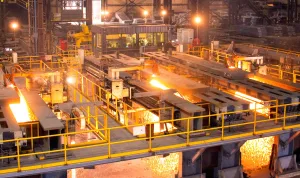How a London Metal Exchange Warehouse in Hong Kong Could Transform the Global Metals Trade

The potential establishment of a London Metal Exchange (LME) warehouse in Hong Kong represents a significant development in the global metals trade. This strategic move could reshape market dynamics, influence trading practices, and enhance Hong Kong’s role as a major trading hub. This article delves into the potential impacts of an LME warehouse in Hong Kong, exploring its implications for global metals trading, market efficiency, and investment opportunities.
1. The Role of the London Metal Exchange
a. Overview of the LME: The London Metal Exchange, established in 1877, is one of the world’s largest and most influential metals trading platforms. It provides a global marketplace for trading non-ferrous metals, including aluminum, copper, zinc, and lead, among others. The LME plays a crucial role in setting global metal prices and facilitating transparent trading.
b. Existing Warehouse Network: The LME operates a network of warehouses across key global trading hubs. These warehouses store metals and ensure their availability for delivery against LME contracts, supporting the efficiency and liquidity of the global metals market.
Role and Impact: Understanding the LME’s role and its existing warehouse network is essential for appreciating the significance of establishing a warehouse in Hong Kong.
2. Strategic Advantages for Hong Kong
a. Enhanced Trading Hub Status: Hong Kong’s position as a major financial center and trading hub in Asia makes it an ideal location for an LME warehouse. The addition of an LME warehouse would bolster Hong Kong’s role as a key player in the global metals trade, attracting more trading activity and investment.
b. Improved Market Access: An LME warehouse in Hong Kong would provide easier access to the Asian metals market, a region with growing demand for various metals. This improved access could enhance liquidity and trading efficiency, benefiting both traders and investors.
Advantage: Establishing an LME warehouse in Hong Kong would leverage the city’s strategic location and financial infrastructure, enhancing its position in the global metals market and attracting increased trading volumes.
3. Potential Impact on the Global Metals Trade
a. Increased Market Liquidity: A new LME warehouse in Hong Kong could increase market liquidity by providing additional storage capacity and improving the availability of metals for trading. This enhanced liquidity can lead to more efficient price discovery and reduced volatility in metal prices.
b. Price Transparency and Stability: The presence of an LME warehouse in Hong Kong would contribute to greater transparency in metal pricing by providing a reliable and regulated storage option. This increased transparency can help stabilize prices and reduce the risk of market manipulation.
c. Trade Flows and Supply Chains: The establishment of a warehouse in Hong Kong could influence global trade flows and supply chains. It may encourage the rerouting of metal shipments through Hong Kong, optimizing logistics and reducing transportation costs for traders and suppliers.
Impact: The potential impacts of an LME warehouse in Hong Kong include enhanced market liquidity, increased price transparency, and changes in global trade flows, which could reshape the dynamics of the metals trade.
4. Implications for Investors and Traders
a. Investment Opportunities: The establishment of an LME warehouse in Hong Kong may present new investment opportunities for market participants. Investors could benefit from increased market access, greater liquidity, and improved trading conditions.
b. Strategic Partnerships: Traders and investors may seek to form strategic partnerships with local entities and leverage Hong Kong’s financial infrastructure to capitalize on the opportunities presented by the new warehouse.
c. Risk Management: Enhanced market liquidity and transparency can improve risk management for traders and investors, providing better tools and resources for managing price fluctuations and supply chain disruptions.
Implications: Investors and traders should consider the potential benefits and opportunities associated with an LME warehouse in Hong Kong, including investment prospects, strategic partnerships, and enhanced risk management capabilities.
5. Challenges and Considerations
a. Regulatory and Compliance Issues: Establishing a warehouse in Hong Kong may involve navigating regulatory requirements and compliance standards. Ensuring adherence to local regulations and international trading standards is crucial for successful implementation.
b. Market Competition: The introduction of an LME warehouse could intensify competition among existing trading hubs. Hong Kong would need to offer competitive advantages and services to attract and retain market participants.
Challenges: Addressing regulatory and competitive challenges is essential for realizing the benefits of an LME warehouse in Hong Kong. Strategic planning and collaboration with local authorities can help overcome these obstacles.
6. Conclusion: Shaping the Future of Global Metals Trade
The potential establishment of a London Metal Exchange warehouse in Hong Kong represents a transformative opportunity for the global metals trade. By enhancing market liquidity, improving price transparency, and providing strategic advantages, the new warehouse could reshape trading dynamics and elevate Hong Kong’s role in the global market.
For investors, traders, and market participants, this development offers new opportunities for growth and investment. Navigating the associated challenges and leveraging the benefits of increased market access and liquidity will be key to maximizing the potential impact of the LME warehouse in Hong Kong.
This article provides a comprehensive analysis of the potential impacts and opportunities related to the establishment of an LME warehouse in Hong Kong, offering insights into market dynamics, strategic advantages, and future implications for the global metals trade.



